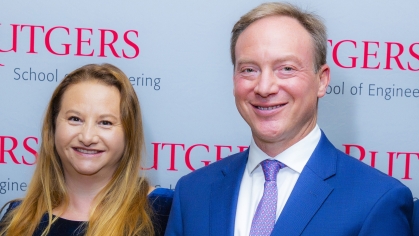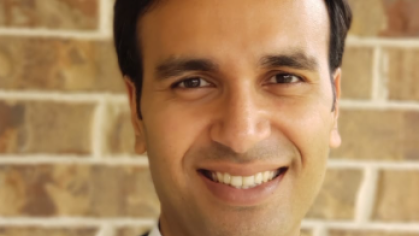
“I can’t emphasize enough the importance of optimization and statistics to advances in machine learning. The solid knowledge I gained in these areas at Rutgers contribute in positive and significant ways to my own success and learning in this area.”
– Di Wu, PhD
Vice President, Machine Learning and Customer Risk Modeling, Risk Management, American Express Company
As a doctoral candidate in the School of Engineering Department of Industrial and Systems Engineering (ISE), Di Xu focused his research on multivariate statistical process control and robust optimization. After earning his Ph.D., he began working at American Express in various roles in data science, including acquisition, underwriting, and fraud and customer management functions. He now leads machine learning research in credit and fraud risk management. He also heads up customer risk modeling functions globally. Currently, he heads the company’s Model Risk Committee. He has recently helped to create a long-term fellowship/internship program spearheaded by ISE between Rutgers and American Express that is in its first year.
Where did you grow up?
I grew up in Shanghai China and came to this country in 1997. I finished my undergraduate study in China before coming here.
Why did you choose Rutgers for your Ph.D.?
This was not such a purposeful decision, as at the time I was not so familiar with all the universities in this country. One of the major factors that influenced me was Rutgers’ convenient location close to important metropolitan areas.
Why ISE?
My undergraduate degree was not exactly in industrial engineering. At the time, that was not really an area of academic study in China. The Chinese education system is more granular, more specific, so you choose an area of specific study and go deeper. So, the area for my study was automatic control, which combined engineering. mathematics, and control theory. However, along the way, I picked up a lot of statistics and operational research courses.
In the U.S., there was no counterpart for automatic control, so when applying for my Ph.D., I had to decide on an area of study in engineering. Industrial engineering
happens to be an area that correlated the most to my background – so that’s how I ended up in the field.
Do you think your Rutgers education contributed to your career success?
Yes, definitely. I can’t emphasize enough the importance of optimization and statistics to advances in machine learning. The solid knowledge I gained in these areas at Rutgers contribute in positive and significant ways to my own success and learning in this area.
Did any professor particularly inspire or influence you?
Professor Susan Albin, my thesis advisor, had a pretty big influence on me at Rutgers and even in my professional life. She demonstrated her excellence by always trying to inspire her students. She never tried to micromanage her students or make them follow her cadence. Instead, she wanted to empower and inspire her students to do and achieve their best.
How did she influence your professional life?
I follow her example in the way I manage my own team. I never force them to conduct specific tasks during their daily routine. I give umbrella instructions about what we are trying to achieve and suggest what the best route might be to achieve certain things. After my team’s best attempt at tackling a problem or a challenge, I will listen to their solutions patiently before we analyze the next steps together. In this way, my team is really my best partner.
For my own team, success is really dependent on each individual. As a leader, it’s really about creating an environment that enables each individual team member to achieve their goal. It’s not about the mandate or instruction. It’s more about instituting a process, a protocol, and a benevolent environment where everyone in this environment can thrive and achieve their dreams. I fully trust my own team’s ability to succeed.
What is your management philosophy?
I feel micromanagement may not lead to an optimal solution, though it may lead to a decent solution. I know well my ability – my own wisdom will never be optimal. As my team grows larger, there’s no perfect way to dictate everything.
My philosophy has also to do with my own experience in China. China’s society on paper is socialist, although right now it is a lot more open to trying to do what capitalism does. More than 20 years ago, when I grew up, the system was a lot more rigid. China has gone through such a long period of a rigid way of running the country – which is why there had not been as much rapid technological development around the time I came to this country. Then everything was 100 percent government run. Today, about 50 percent of things are run by individuals. This has already made transformational change to the society in the last 20 years.
I firmly believe that if we rely on individuals even though they may make some mistakes, their collective wisdom will far outweigh the outcome of a single person. This is how I run things.
What do you know now that you wish you’d known as a student?
I didn’t realize in China or at Rutgers, or even within my company at first just where the profound implication of automation and advanced computing would lead society.
This will have a gigantic impact on everything we are doing as a society for our own next generation, for my own children. Advanced computing will really unleash the power of automation. The computer can do more and more of what humans can do. To my mind, there are very few things that computers can’t do. We are thinking they can replace blue collar workers and repetitive factory workflow. Computing will have an equal impact on white collar jobs. Even five years ago, we never thought some lawyers’ work or news reporting could be replaced by a computer – but this is happening today.
I think this automation will penetrate every corner of the professions we have today. It’s hard to predict the outcome of this. On the one hand, if computers can do everything people can do, they will create infinite wealth for everybody in the world. On other hand, there would be nothing else left for humans to do. The extreme case – perhaps you could enjoy human life in a profession that empowers the computer even more.
What inspired or motivated you to help create a long-term fellowship/internship program between AmEx and Rutgers?
I lead machine learning practices at AmEx. This particular area really relies on young people who are just out of school, since this area knowledge and learning tends to evolve or even double every six months. So, I think it makes a lot of sense to tap into young talent.
This reflects my hiring philosophy: instead of hiring more experienced people from the market directly, it will be much more efficient and effective to get people out of school and train them and groom them from day one. For my own team, instead of hiring experienced talents with limited growth potential, I tend to hire those with less experience but more growth potential, which makes them more valuable in the long term.
This is part of the enjoyment I get from leading a team that I can influence and grow very early on. I can see them grow professionally more capable. When you hire talent right out of school, or even while they are still in school as interns, they can mix with my team even before they graduate. This gives us more of an opportunity to train and grow them – and that benefits both parties.
I wanted to have such a program that lets young talents contribute early on to our machine learning undertaking within AmEx. With this in mind, I needed to decide where to start. It’s always better to have alliance with a university – and Rutgers, of course, was the first university I thought of.
How many students are participating in the program?
Right now, we have our first three Ph.D. students, who have been with us for about two months.
What do you most enjoy about your job?
Machine learning evolves very fast. We have to make conscious efforts to learn constantly to keep up with developments in this field. Learning is always good – even for someone like me who has been in the profession for almost 20 years. I find great satisfaction and enjoyment in learning new things.
I believe there’s no perfect person. What matters is not becoming a perfect person – what matters a lot is becoming an improving person. That’s my philosophy.
What do you do for fun?
I read a lot of history books. I read a lot of biography. I do a lot of computer science stuff for fun. I like to create computer games for fun – and I use this to teach my own two daughters basic knowledge computer science.
What is a book that has recently impressed you?
I also read professional books, mostly about computer science, machine learning, and leadership. I was very impressed with How Google Works by former Google CEO Eric Schmidt and others. It really summarizes a lot of very positive leadership examples and lessons that helped Google become so successful.
If you were to go on vacation tomorrow, where would you go?
If I took a vacation by myself, I’d want to go to South America and then explore Antarctica. For a family vacation, I’d love to go to Australia – if I had a sufficient amount of time.


